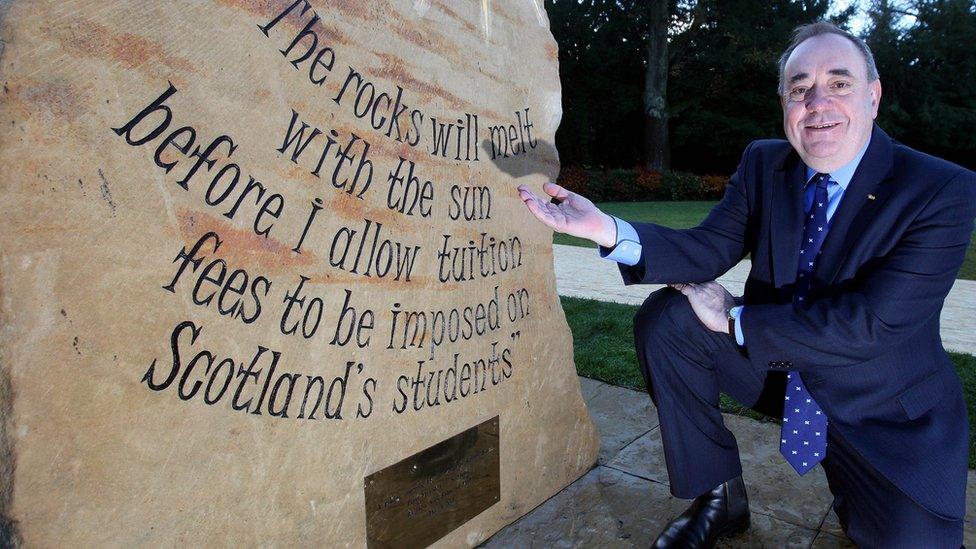Scotland lags behind on poorer students
- Published

Alex Salmond unveiling monument to abolition of tuition fees
It was, said Alex Salmond, as he unveiled a stone monument at Heriot-Watt University, his administration's "biggest achievement".
The abolition of tuition fees certainly set Scotland on a different path, and the monument has locked the SNP into its flagship policy.
There's no doubt it has saved hundreds of thousands of students from repaying debts out of their graduate salaries.
But, as a detailed analysis published today shows, there is little evidence it has propelled many more working class Scottish students into university.
The research was commissioned by the Sutton Trust in England, which has long scrutinised social mobility.
In itself, that raises interesting questions about why this kind of work is not being funded within Scotland.
'Bank of mum and dad'
The research, compiled by academics from the University of Edinburgh, points out that middle-class Scottish students leave university with less debt than any group in the UK.
They do not pay tuition fees, and unlike the poorest students, it's the bank of mum and dad that's likely to pick up the costs of rent, food, books and bills.
Not surprisingly it seems to have been a popular policy.
But most of the progress in helping poorer students into higher studies in Scotland has been in Further Education colleges.
Some transfer to university, but quite often have to repeat a year, suggesting it's not an easy experience.
And pressure will build in the system as the number of total number of university places is limited by government.
Today's report warns that it's the disadvantaged that lose out most from that limit - when competition for places is stiff, middle-class elbows tend to be sharper.
'Unsustainable'
The wealthiest students in Scotland are four times more likely to go straight to university than those from the poorest families.
It's a gap that is bigger than any other part of the UK.
There has been a scheme to ring-fence some places at elite Scottish universities for poorer students, which has been successful.
That comes to an end this year, with the places being absorbed into the total, as agreed at the outset with the government.
Last autumn, the Commission on Widening Access in Scotland warned the inequality in universities was "unfair, damaging and unsustainable".
The Scottish government has accepted something needs to be done.
Plans for a Commissioner for Fair Access are expected soon with details of how universities can be held to account.
Of course without a further increase in the number of places letting more disadvantaged students in can only come at the expense of the better off.
No wonder the National Union of Students is calling for more places, and in Scotland that could only be done by more direct funding.